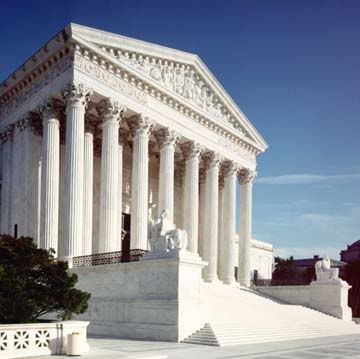SCOTUS Follows, Doesn't Lead

SCOTUS Is A Mirror, Not a Searchlight
The Supreme Court has almost never been in front of the public consensus on any issue, including the most contentious issue of any era in history. The perception of the Court's importance has grown as special interest organizations have become more involved in the political process. These organizations have a vested interest in insuring that every political activity becomes an issue of contention. With only the middle ground to occupy none of these organizations on either end of the political spectrum would have much appeal.
Two weeks ago Senator Susan Collins pointed out the obvious regarding President Bush's upcoming Court nomination:
"It just amazes me how many outside interest groups are spoiling for a fight. They're going to be very disappointed if the president nominates a consensus choice. They're not going to be able to raise as much money. They're not going to be able to put on as many divisive ads. They're going to be really crushed."The stakes haven't grown higher just the rhetoric.(emphasis mine)
In his 1991 book "The Hollow Hope: Can Courts Bring about Social Change?" political scientist Gerald Rosenberg presented powerful evidence that even landmark cases such as Brown vs. Board of Education and Roe vs. Wade either had little practical effect or simply reflected broader societal changes that were already underway.
Although Rosenberg was at first roundly attacked by legal scholars (who have something of a professional stake in believing that Supreme Court decisions matter), today many constitutional experts accept that Rosenberg was correct: Courts rarely mount serious challenges to the preferences of political majorities. As Stanford Law Dean Larry Kramer put it, "There is now a general consensus among social scientists that courts have not been a strong or consistent counter-majoritarian force in American politics."
In other words, Supreme Court decisions are more of a mirror than a catalyst, reflecting public opinion far more than they shift it. This shouldn't surprise us; Supreme Court justices, like the rest of us, are influenced by shifting social mores. And they know that the court's institutional credibility — and ability to get its decisions enforced — depends on not getting too far ahead of the curve.
If Judge Roberts and the new conservative majority of the Court move away from the comfort zone of the American public it will mark one of the most radical changes in the history of the Supreme Court. A change that when laid at the feet of the Republican Party will guarantee that the they become a minority party in all 50 states (OK, maybe not Utah).










<< Home